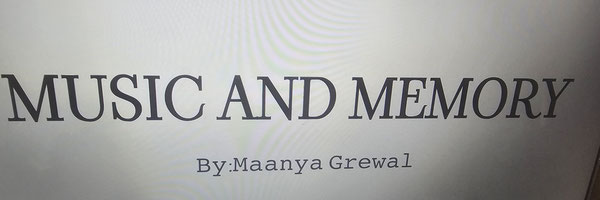Music and Memory
Grade 6
Presentation
Hypothesis
My hypothesis is that music can have varying effects on the human brain. I believe that the absence of music will lead to the worst outcomes for memory span and cognitive function. Without any musical stimulation,the brain may feel empty or unengaged. On the other hand,I propose that classical music will have the most positive effects. This genre often features complex structures,soothing melodies,and rich harmonies. Such qualities can promote relaxation and reduce stress. Listening to classical music may enhance concentration and improve memory. It can create an environment that fosters creativity and deep thinking. In conclusion,my hypothesis stands that while a lack of music can lead to negative effects on the memory of a human being,classical music has the potential to bring about more positive effects.
Research
What different parts of the brain connect to music and how?
The corpus callosum ensures the right and left sides of the brain communicate. This communication is key for tasks needing both sides. Next, the motor cortex handles movement. For example, it is active when a dancer leaps or a guitarist strums. The prefrontal cortex manages behavior and decisions. It helps a musician decide how to express a song's emotion. Emotional reactions to music involve the nucleus accumbens and amygala. These areas create feelings of joy or sadness while listening. The sensory cortex processes touch. A dancer feels the floor; a pianist feels the keys. The auditory cortex listens and understands music. It lets us hear a melody and grasp its tune. Music memories rely on the hippocampus. This area links songs to past events and feelings. If a dancer watches their own performance or a musician reads sheet music, the visual cortex is at work. Finally, the cerebellum aids movement and emotion. It helps a dancer keep balance or a musician feel the music's emotional pull. These brain areas work as a team when we dance or play music.
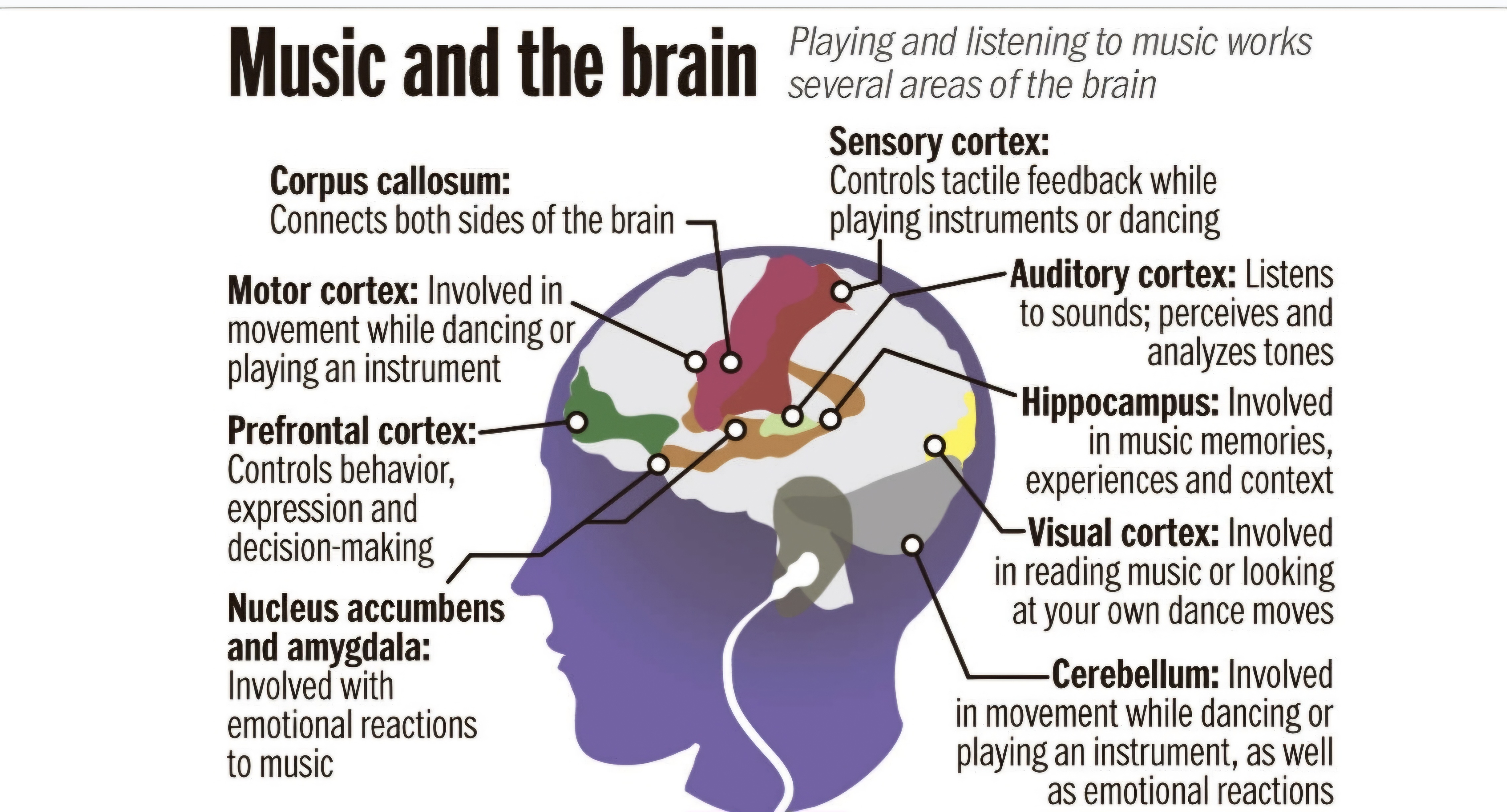
What are the different types of memory and how are they processed in the brain?
Memory has many different forms. Short term memory briefly holds information. Imagine remembering a phone number just long enough to dial it. Long term memory stores information for a long period of time. Think of remembering your childhood home. Episodic memory is for events. Like recalling your last birthday party. Semantic memory is for facts. Such as, knowing the sky is blue.
The brain deals with each type in its own way. Short term memory often uses the prefrontal cortex. This brain area is near the front of your head. Long term memory relies on the hippocampus. This is a seahorse shaped area deep inside your brain. These areas work together. They help both to encode and recall memories. Encoding is like saving a file. Recalling is like opening it later.
What are the key components of musical perception,and how does the brain process music in comparison to speech or other sounds?
Musical perception involves rhythm. It also has melody and harmony. These two components work together. The brain tackles music in lots of spots. Auditory regions handle sound while motor regions deal with movement. These both can activate simultaneously. Music and speech share lots of features. Both use sound patterns which include tone and timing. Music often sparks stronger emotions. A sad song can make us cry and a humorous song can make us laugh. Music's effect on the brain is broad and it spreads wider than speech. For example, a symphony activates many areas. These areas process feelings and memories. Speech mainly lights up language centers.
What is the concept of "musical imagery," and how do people use music in their minds to recall or reinforce memory?
Music imagery is like hearing music inside your mind. People use this to bring back old memories. A certain song can make you think of a very specific time in your head. When you hear a familiar tune, it can make a memory stronger. For example, maybe a song reminds you of your high school graduation. The music can make you feel like you are their again. It brings back the joy and excitement of that day. Or, a song might remind you of a past relationship. The melody can bring back feelings of love or sadness. This shows how music and memory are closely linked. Our brains save songs, along with memories. So, music can be a strong trigger for our memories.
How do cultural differences influence how people percieve and relate to music to memory?
Culture deeply influences our musical perception. It also molds how music connects to our memory. The same song can evoke different feelings through different cultures. Consider lullabies. In many Western societies, they soothe babies to sleep. Yet, some cultures may view these melodies as unusual or even unsettling. Cultural background strongly shapes our musical preferences. It affects the memories linked to different songs. Think about national anthems. They stir patriotism in one country but they may mean little to someone from another nation. Music and memory are not universal. They are filtered through our cultural lens.
What are the therapeutic uses of music and what mechanisms are believed to underlie these effects?
Music offers real help for people facing memory challenges. This includes individuals suffering from Alzheimer's disease. It also helps those struggling with dementia. Music therapy can also help lift spirits. It can bring back old memories. Music's impact is linked to how the brain works. Areas of the brain tied to music often stay active. This is true even when other brain areas are damaged by disease. Music acts like a key of some sorts. It unlocks moments and feelings from the past. A familiar song can unlock vivid recollections. It might be a childhood event or maybe a special person. These connections show music's unique power. It can reach through memory loss and can offer comfort and a sense of connection.
How do personal associations and familiarity with music influence how people recall memories tied to certain songs or pieces of music?
Music deeply affects us because of personal connections. A song from your high school days can instantly trigger memories. It might remind you of friends, events, or even feelings you had back then. Hearing familiar music can bring you a sense of comfort. It feels like a warm hug on a bad day. This is because your brain links music to happy and safe times. These emotional links to music create stronger memories. The association makes a memory much more vivid. It also makes it easier to recall details. You might remember exactly who you were with or what you felt at a certain moment. Music acts as a powerful memory trigger. It can bring back moments from the past with clarity.
What are the cognitive benefits of music training, and does learning to play an instrument affect memory abilities?
Learning a musical instrument gives the brain many advantages. Music lessons can sharpen memory skills. For example, musicians often remember long pieces of music. They also recall details more easily. Playing music needs focus and this practice increases attention spans. People learn to block out distractions and they also improve concentration. Playing an instrument uses many parts of the brain. Reading music, moving fingers, and hearing tones all happened at once. These activities strengthen connections between brain areas. Improved brain function leads to better thinking. This can help in math, reading, and problem-solving. Music training can improve abilities. These abilities apply to school, work, and life.
Variables
Independant/Manipulated Variables:
- The subject
- The different music genres
Dependant/Responding Variables:
- The colors in the memory test
Controlled/Constant Variables:
- The device the music is played on
- The headphones
- The memory test
Procedure
Acquire a set of flashcards and divide each card into five distinct sections. Designate the first section as "No Music" and assign a different music genre to each of the remaining four sections,ensuring that each genre is unique. Repeat this structure across a total of ten flashcards.
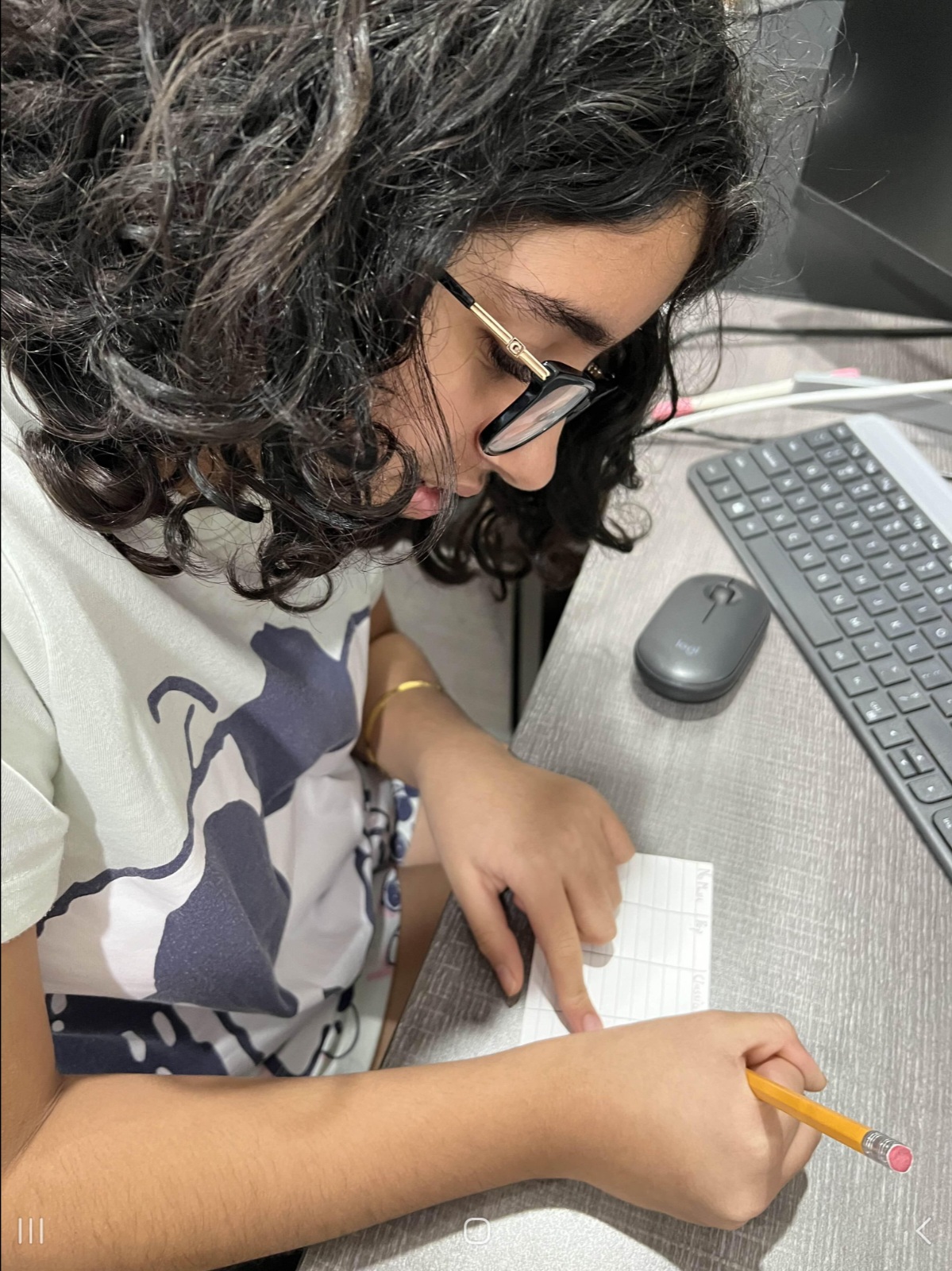
For the first flashcard,assign one color to each section;for the second,use two colors per section.
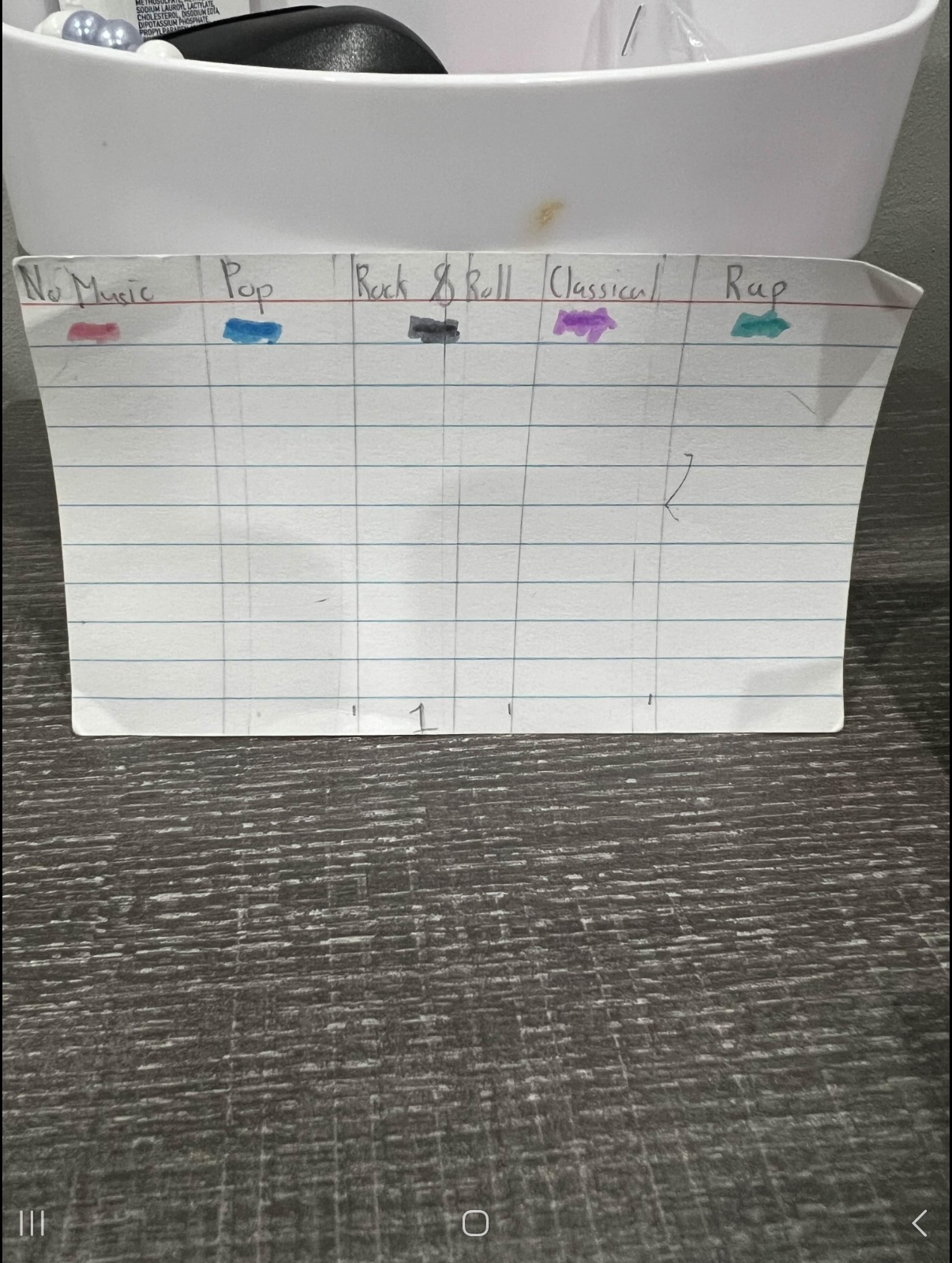
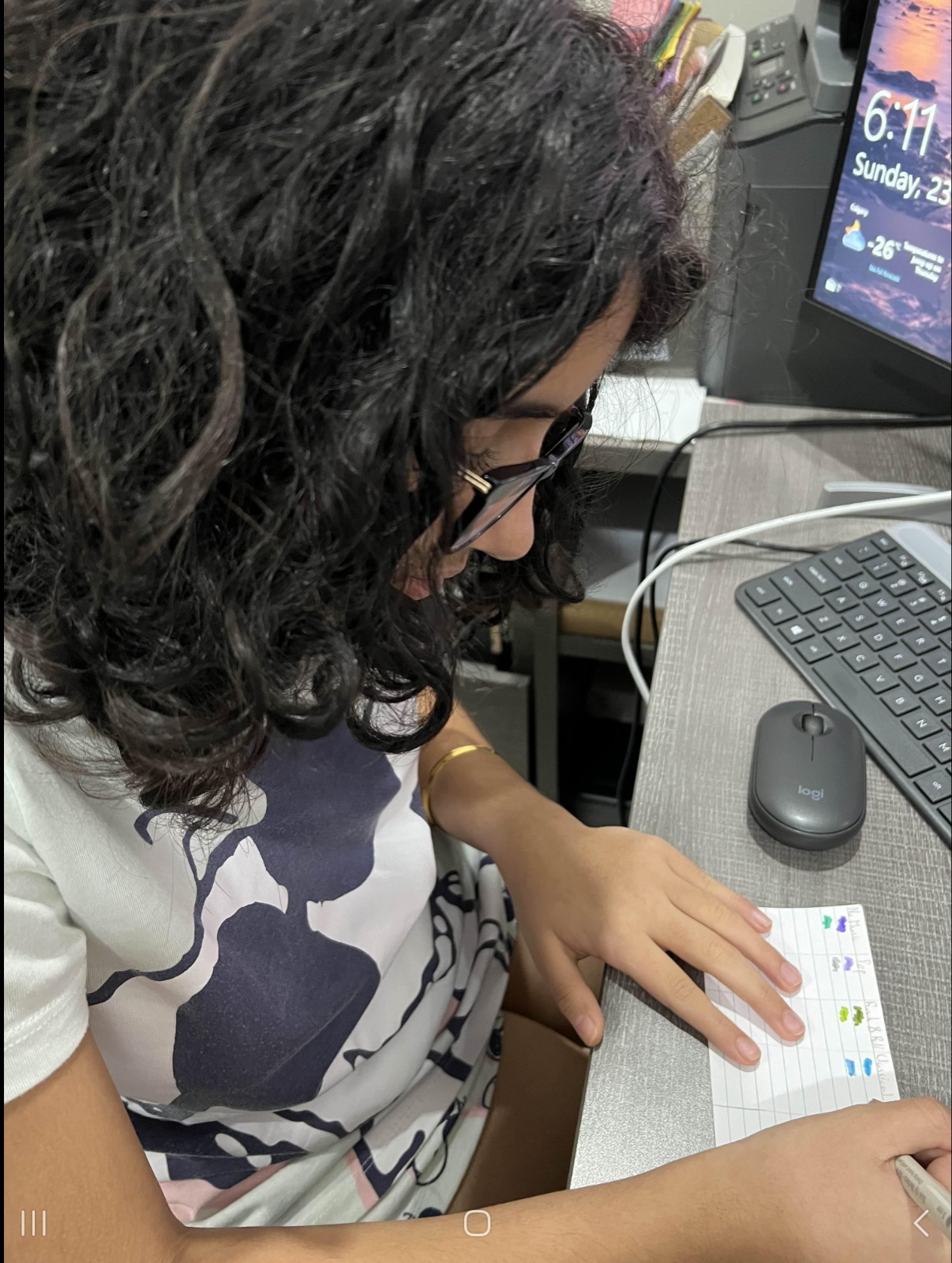
Continue this pattern until the tenth flashcard features ten colors in each section.
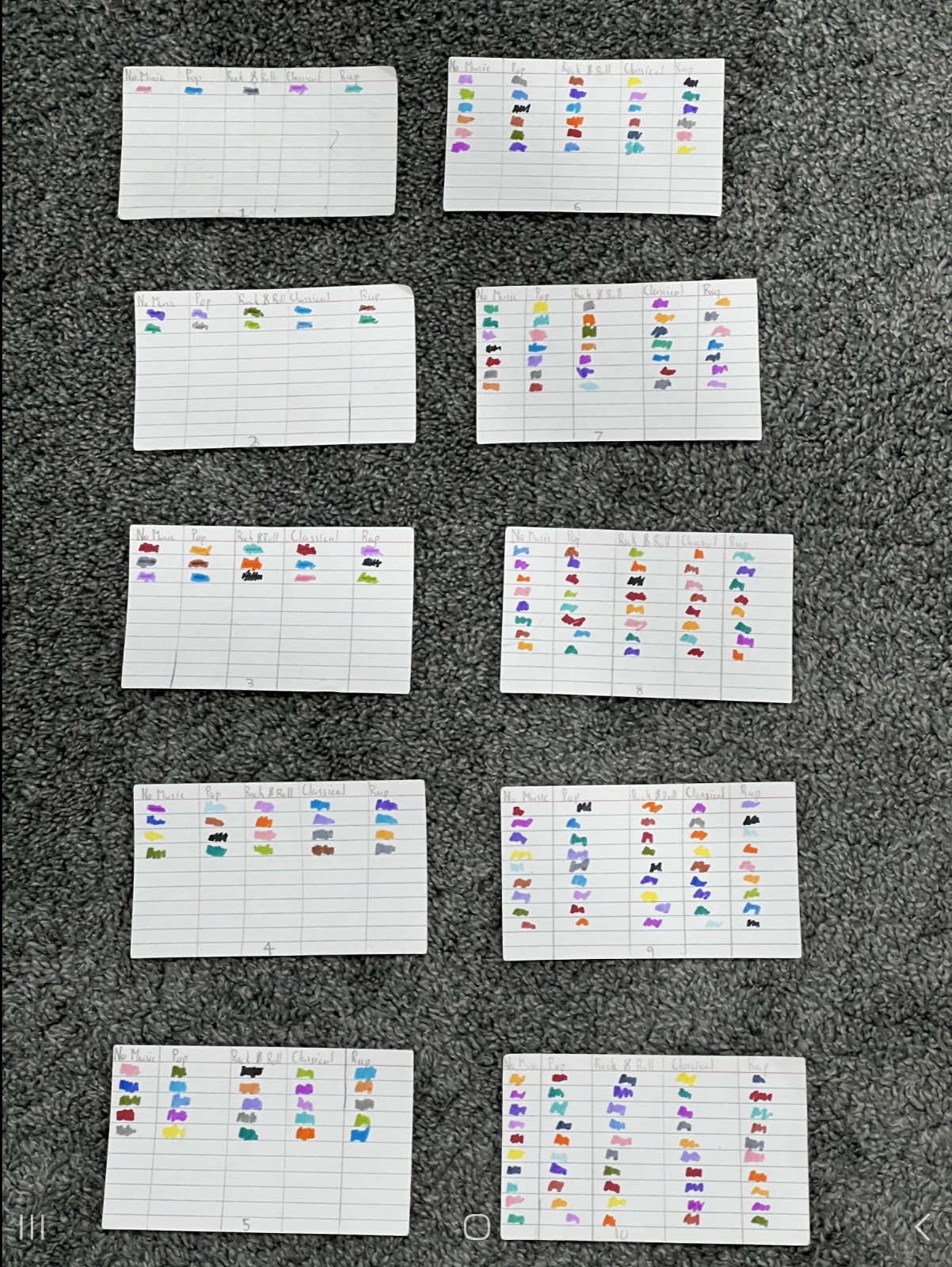
Begin with the first flashcard by stating the color listed under "No Music". Progress to the next flashcard,announcing the two colors under "No Music" and continue this process until the individual makes an error,which should be recorded on the chart. Subsequently,repeat this procedure for the next section while the individual listens to the corresponding genre of music. Maintain this method until all genres have been covered,then proceed to the next participant and replicate the process.
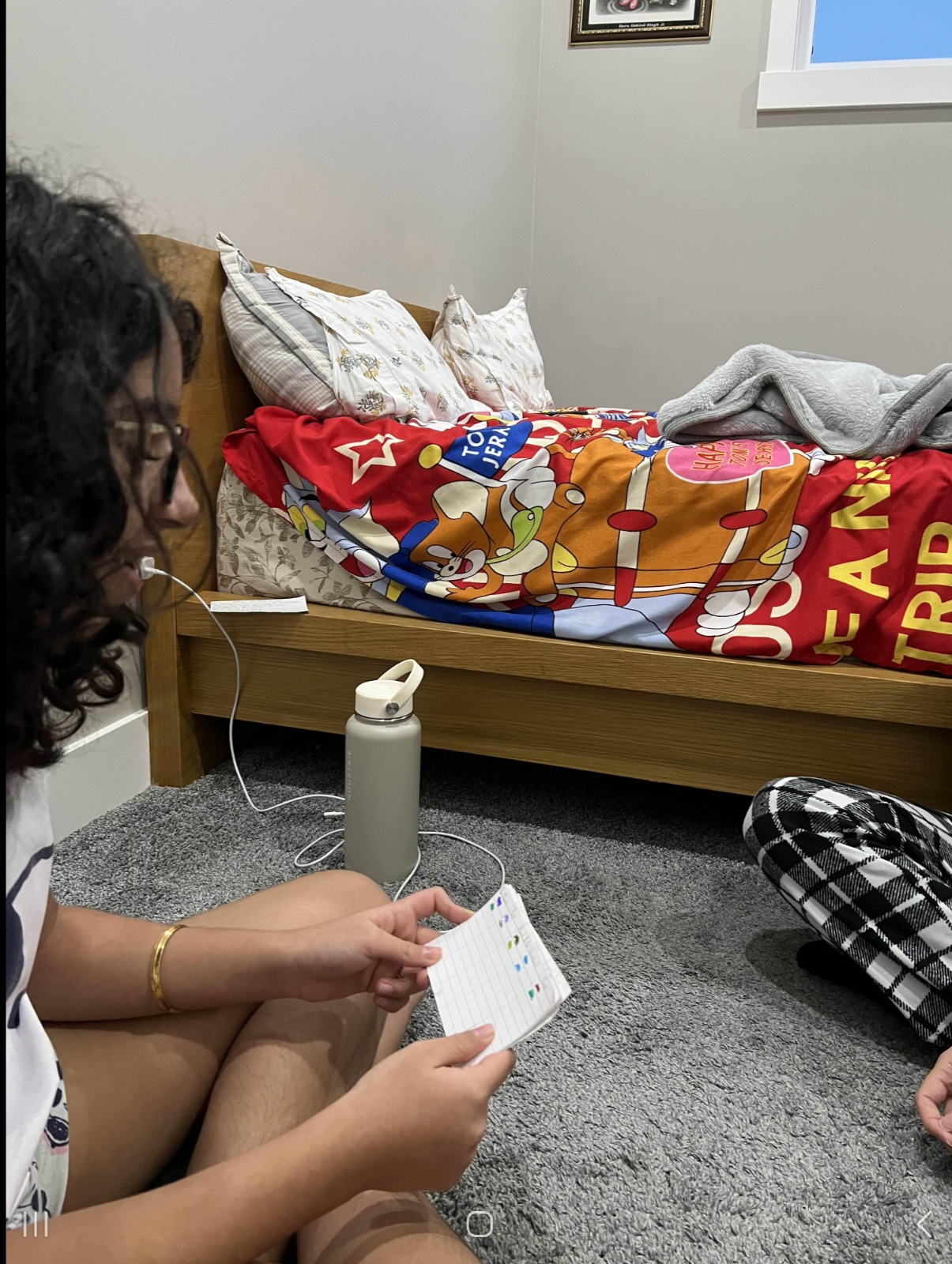
Observations
Hannah
In my experiment with Hannah,I observed notable differences in her reactions to different music genres. When calmer music,such as Rock and Roll or Classical pieces were played, here performance improved markedly,with enhnaced focus and energy levels. This positive change was particularly evident in contrast with her responses to other music genres.
Conversely,when Rap music was introduced,Hannah indicated that it was quite distracting for her. She noted that the rapid beats and and rythmic lyrics diverted her attention from the memory test. This disparity in her reactions highlighted the distinct impact of different musical elements on concentration and performance. Overall,her insights showed the significant roles that music plays in influencing focus and effectiveness within an experimental context.
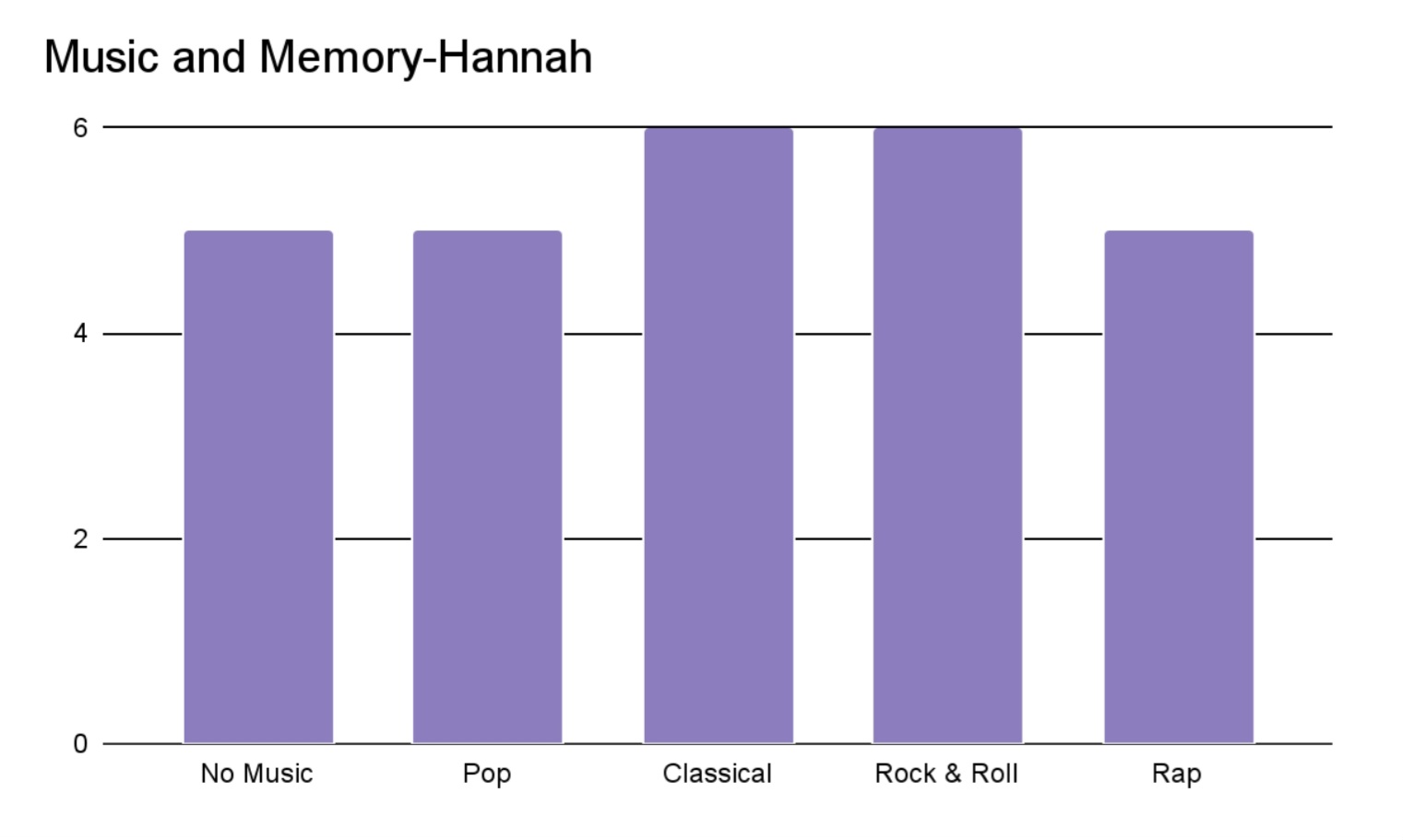
Gurneet
In the course of the experiment with Gurneet,I noted her responses to various music genres. She demostrated more enthusiasm for familiar music genres like,Rap and Pop music,where her enjoyment was clearly evident. Her familiarity with the the rhythms,beats,and lyrics contributed to a noticable improvement in her performance.
Conversely,when I transitioned to calmer music,such as Classical,her enthusiasm quickly diminished. She did not connect with the genre in the same manner,as reflected in her body language and reactions. This stark contrast between her enthusiasm towards Rap and Pop and lack of interest towards Classical shows the importance of personal prefrence towards music enhancement.
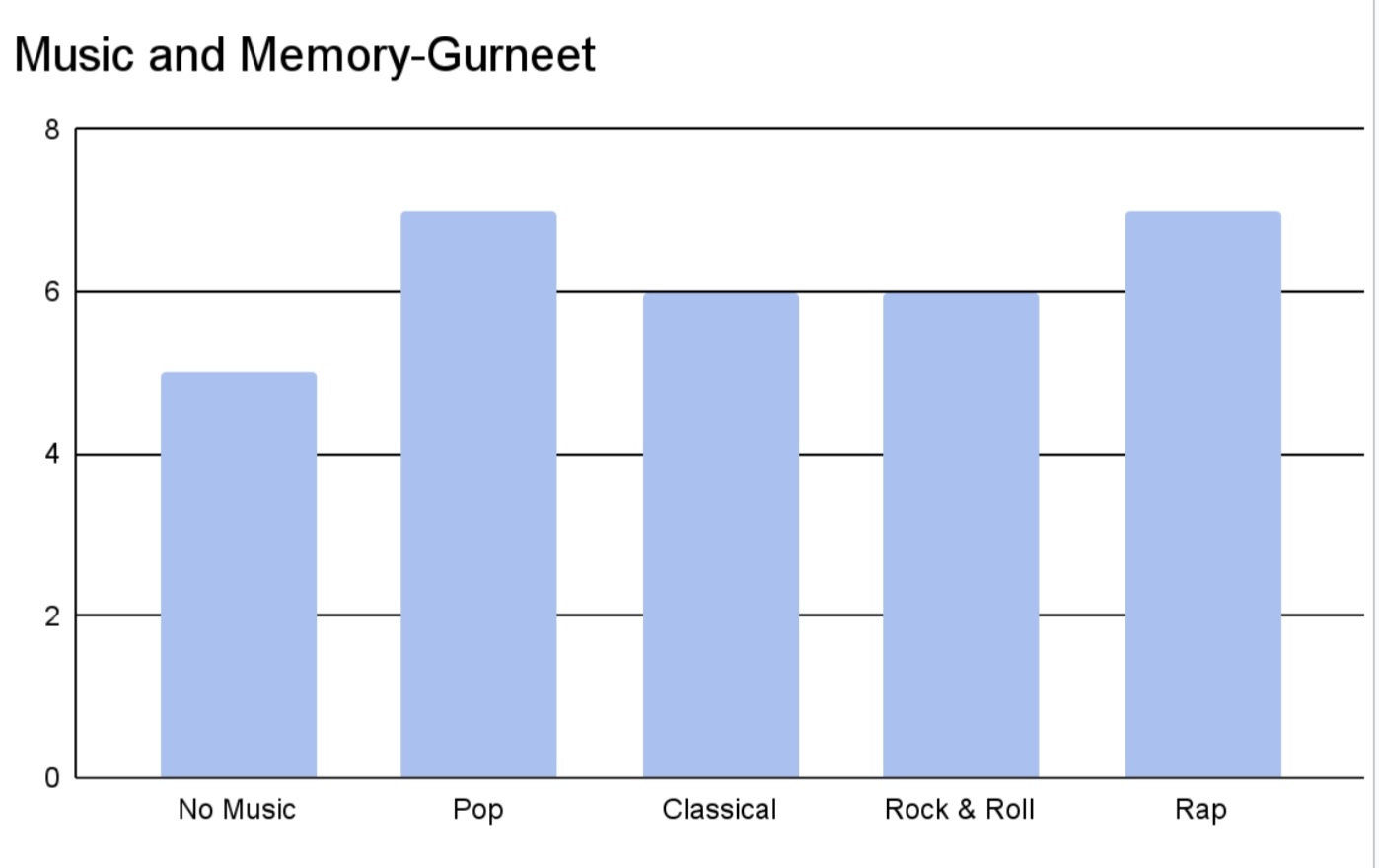
Meher
In my experiment with Meher,I observed notable differences in her music preferences. When Pop music was played,she responded positively,nodding her head in rhythm and demonstrating her enjoyment of the engaging beat.
Conversely,her reaction towards Rock and Roll was very different;she seemed distracted and disengaged,indicating that this genre wasn't the best pick for her and didn't contribute to her memory.
The shift to Rap music revealed her discontent even more,as she tightly covered one ear as it was playing,signalling her annoyance and difficulty in focusing on the memory test. This highlighted the varying emotional responses elicted by different musical responses.

Mom
During my experiments with my mother,I observed that she got very low scores. She was evidently making a significant effort to concentrate on the memory test. Rather than becoming distracted by the music in the background,she focused her attention solely to me. It was intriguing to witness her ability to diminish the music in the background,particularly since she rarely listens to it. She expressed that the Rock and Roll and Rap genres were especially distracting for her. Despite the surrounding noise,she remained focused on the memory test,demonstrating clear determination even as the vibrant beats and rhythms sought to distract her. This tension between her concentration and the music contributed to a distinctive atmosphere during our shared experiences.
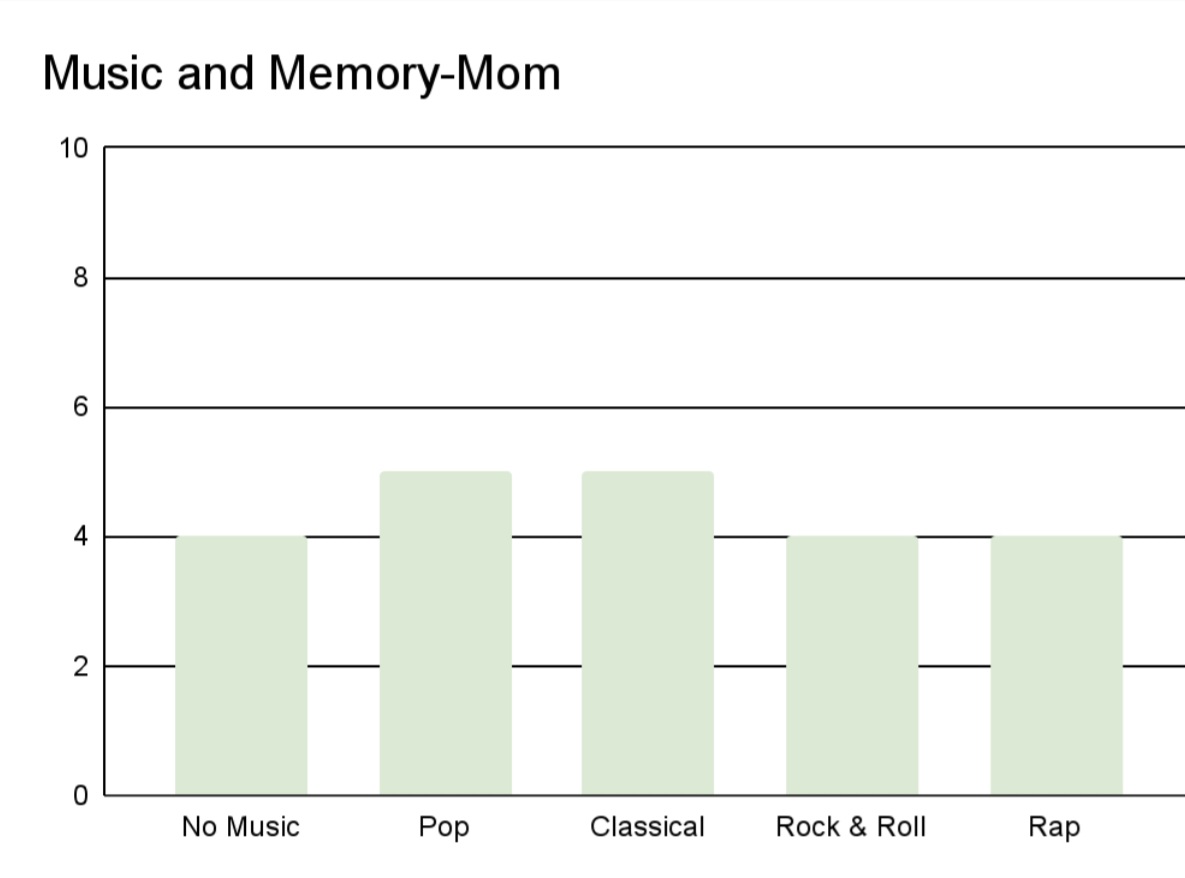
Mehakdeep
In my experiments with Mehak,she acheived the highest score among all the participants,marking a significant demonstration of her memory.While Classical music played softly in the background,she shared her perspective,stating that she found it rather dull. Interestingly,this perceived boredom appeared to enhance her memory,as she noted that the tranquil and consistent nature of Classical music enhanced her performance..
Conversely,Mehak expressed a contrasting opinion regarding genres such as Rock and Roll and Rap,which she found to be distracting. The rapid tempos and pronounced rhythms hindered her concentration,as she felt the energetic melodies divert her attention away from the memory test. This distinction between her experiences with Classical music and other genres showed the varying effects that different music styles can have on attention and memory.
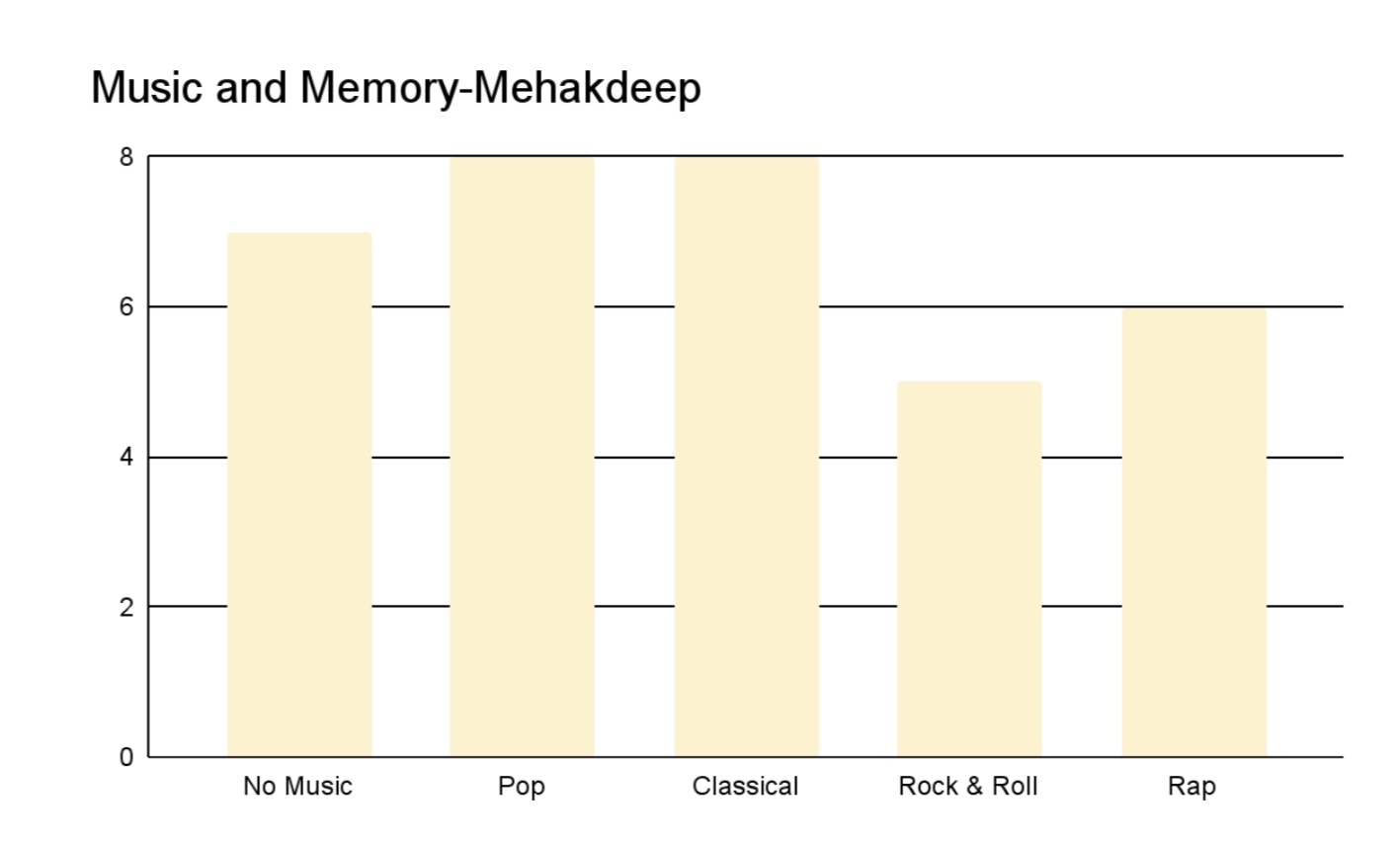
Khushneer
Throughout the experiement with Khushu,I closely monitored her behavior. She chose to close her eyes while doing the memory test,a seemingly simple action that seemed to enhance her concentration. Upon inquiring about this choice,she articulated that shutting her eyes helped eliminate distractions,thereby allowing herself to fully immerse herself into the experiment.
Khushu also expressed her opinions on music,specifically Rap,which she identified as a distraction. While many individuals find music helpful towards their work,she found it hindered her concentration. By removing such distractions,she performed more efficiently towards the memory test. It was intriguing to observe how she customized her surroundings to optimize her focus and memory.
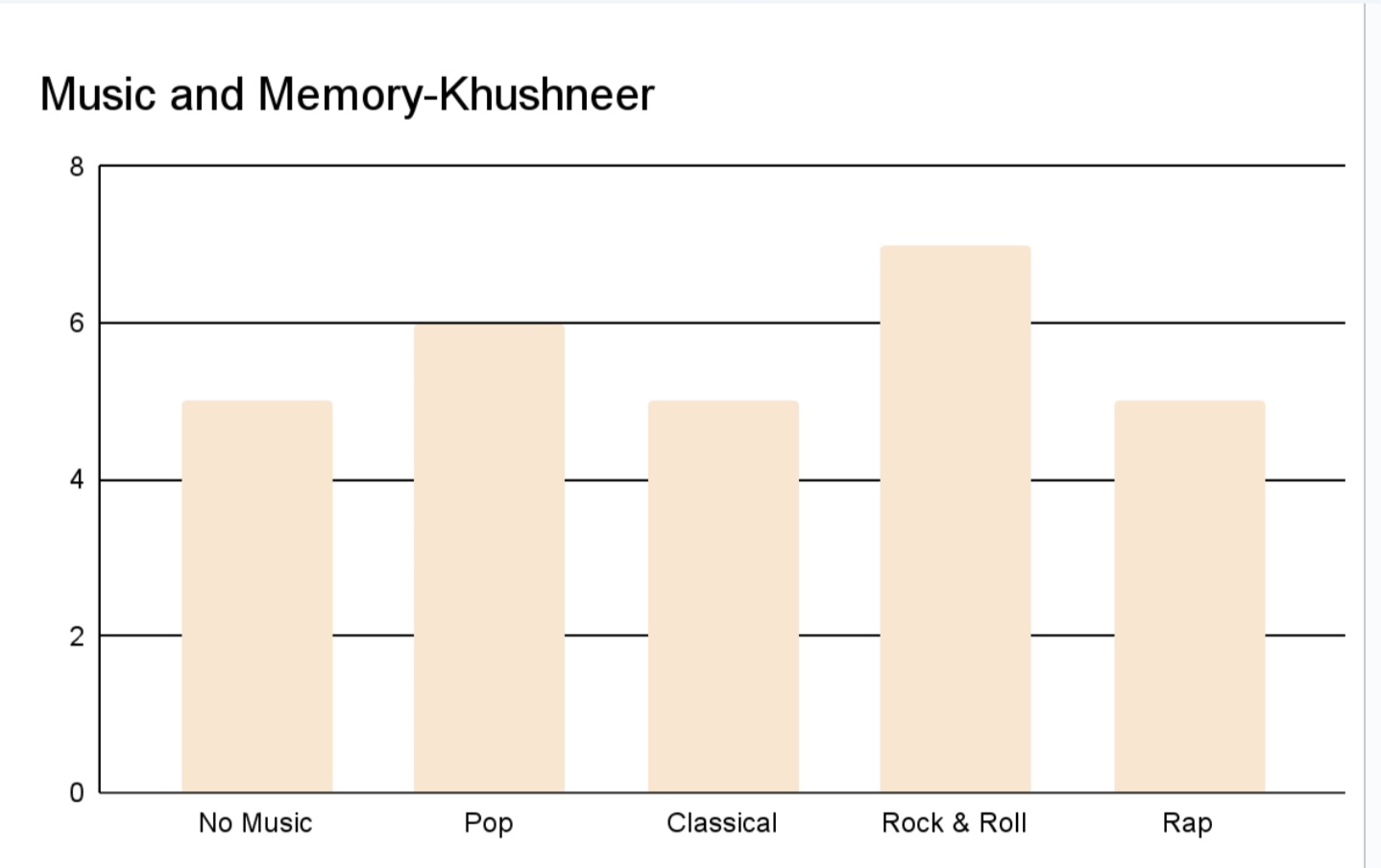
Analysis
The outcomes of the experiment indicated that music preferences significantly influenced the participant's performance. Nearly all individuals performed poorly on the memory assessment when in silence, suggesting that the absence of music hindered their ability to concentrate, with the exception of Mehak, who still excelled without music. This implies that a majority of individuals perceive music as a beneficial aid for enhancing focus and memory.
Many participants reported that rap music was particularly distracting, citing the rapid tempo as a barrier to memory. The intricate lyrics posed additional challenges, making it difficult for them to retain information while attempting to remember the color order. Certain musical genres can indeed excaberate difficulties in enhancing memory.
Pop music emerged as the preferred genre, with participants achieving the highest scores while listening to it. This finding indicates that pop music may enhance memory retention more effectively then other genres, likely due to its straightforward rhythm and memorable melodies, which facilitate concentration. The various impacts of different musical styles on memory are clearly evident.
| Genres of Music | Average Scores |
| No Music | 5 |
| Pop | 6.7 |
| Classical | 6 |
| Rock & Roll | 5.5 |
| Rap | 5.5 |
Conclusion
In conclusion, it is clear that music has varying effects on memory. Different genres influence how well we remember information. Pop music and Classical music tend to enhance memory. They create a positive atmosphere that helps with recall. On the other hand, Rap and Rock and Roll music can have a negative impact. These genres might distract listeners, making it harder to focus on tasks that require memory.
My orignial hypothesis examined the relationship between music and memory. I believed that music would affect memory in specific ways. It turns out that music does play a role in how we remember things. However, the outcome was not entirely as I expected. I found that Pop music has the strongest positive affect on memory. This result surprised me as I initially thought Classical music would be the leader. The elements in Pop music, such as melody and rhythm, seem to enhance our ability to retain information better than Classical music does.
Overall, while all types of music affect memory in their own ways, Pop music stands out as the most beneficial for improving recall.
Application
The Music and Memory project gives real help to those with dementia and memory loss. It uses special music playlists to get patients involved. This music can bring back memories and good feelings. It makes them feel better and more connected to the world. Music can also help link how Alzheimer's disease and BROCA'S syndrome affect the brain. Both areas deal with memory and language. When these areas get stimulated, there is greater brain function. Studies show that music therapy works. Patients with dementia feel happier and talk to others more when they listen to music. One study showed a 60% increase in positive mood after music sessions. Also, personalized music helps remember things better. For example, a woman who could not recall her children's names started singing a song from her wedding day. She then remembered her husband and kids. This shows how music can unlock memories that seemed lost. It offers a simple, yet powerful way to improve life for people suffering with memory challenges.
Sources Of Error
Some sources of error in my project were:
- Using some familiar songs that my participants knew of
- Repeating the colors when my participants asked me to
- Doing some tests on different days
- Only doing 6 people instead of 8 or 9
Citations
https://pmc.ncbi.nlm.nih.gov/articles/PMC2776393/
Sacks,O. (2007). Musicophilia:Tales of Music and the Brain. Knopf.
https://houseoftracks.com/faq/why-is-pop-music-such-a-popular-genre-of-music
Acknowledgement
I would like to acknowledge:
- Hannah,Gurneet,Meher,Mom,Mehak,and Khushu for letting me experiment on them
- My parents for giving me the supplies and supporting me
- Ms.Kale for letting me go to CYSF and giving me all the resources I need
- My sister (Meher) for taking pictures of me

